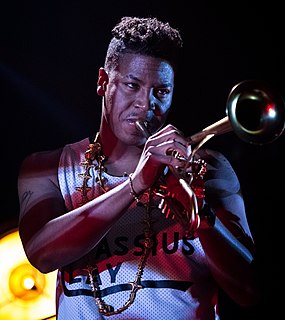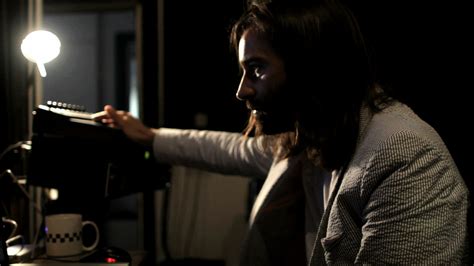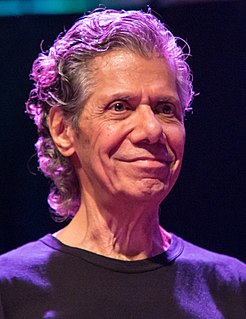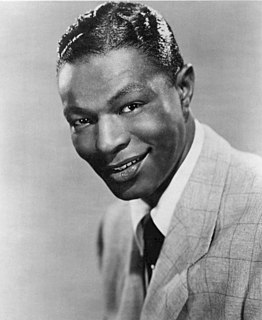A Quote by Christian Scott
What we're doing now, is to try to eradicate the limited notion of how people are interacting with each other through hyper-racialized ideas. A lot of it deal with, as an example, genre. If I ask you to visualize a trap musician or a hip-hop musician, you'll see one thing. If I say visualize a western classical musician, you'll see a very different thing. A lot of how music is disseminated to us is hyper-racialized. It's not something that we think about all the time, but if you take a minute to look back, it's why you get this argument when there's a white rapper.
Quote Topics
About
Argument
Ask
Back
Classical
Classical Music
Deal
Different
Different Thing
Doing
Each
Eradicate
Example
Genre
Get
Hip
Hip-Hop
Hop
How
Hyper
Ideas
Interacting
Limited
Look
Lot
Minute
Music
Music Is
Musician
Notion
Now
One Thing
Other
People
Rap Music
Rapper
Say
See
Something
Take
Thing
Think
Through
Time
Trap
Try
Us
Very
Visualize
Western
White
Why
Related Quotes
I don't understand why we have to experiment with film. I think everything should be done on paper. A musician has to do it, a composer. He puts a lot of dots down and beautiful music comes out. And I think that students should be taught to visualize. That's the one thing missing in all this. The one thing that the student has got to do is to learn that there is a rectangle up there - a white rectangle in a theater - and it has to be filled.
Being a classical musician I'm fascinated with how my colleagues, not just singers, but every musician finds ways to express something else or something new or the same ol', same ol' in classical music. I'm always in dialogue with other musicians at least orally, if I can't be with them and a lot of dead musicians as well. I've learned a lot from dead people on recordings.
People will less and less need to put an identity on genres, such as "hip hop," "electronica" and so forth. That's what I try to do with Princess Superstar. Why should a musician be limited to only one form or one genre of music? And so, I think the same will hold true for the whole male/female categorization.
As a musician, I don't have one thing that's "my thing." I like to create, and have a lot of outlets for it. Dustin Hoffman is one of the guys that sets a model for me, because of how good he is at being such different characters. Every time you see DeNiro, he's pretty much DeNiro - great, but DeNiro. Hoffman is different every time, depending on his character. That's how I see myself as a performer.
What's funny about the slacker thing, people project an image of what they think a musician is: young, slack, unemployed - like a really romantic idea of a poet, writer or musician - which isn't really true a lot of the time. I don't reckon you would know anything about me if I wasn't moderately hard-working.
My only advice as an experience older singer is about singing, it isn't about music. To have a career in music is a completely different question and leads to other kinds of advice and other kind of experts. All you can do is someone planted in my mind very early on, this wonderful truism called, "Fortune favors the prepared mind." Be passionate about being a musician. There is no limit to how hard you must work and how detailed you must be in every facet of what you do, either as a singer, as a musician, or as a person.
In this time, we incorporate money and media, and it's split up like apartheid, where when you say "hip-hop," you think just rap records. People might have forgot about all the other elements in hip-hop. Now we're back out there again, trying to get people back to the fifth element, the knowledge. To know to respect the whole culture, especially to you radio stations that claim to be hip-hop and you're not, because if you was a hip-hop radio station, why do you just play one aspect of hip-hop and rap, which is gangsta rap?
I don't consider myself a musician who has achieved perfection and can't develop any further. But I compose my pieces with a formula that I created myself. Take a musician like John Coltrane. He is a perfect musician, who can give expression to all the possibilities of his instrument. But he seems to have difficulty expressing original ideas on it. That is why he keeps looking for ideas in exotic places. At least I don't have that problem, because, like I say, I find my inspiration in myself.
Overall, I think the main thing a musician would like to do is give to the listener the many wonderful things he knows of and senses in the universe... That's what I would like to do. I think that's one of the greatest things you can do in life, and we all try to do that in some way. The musician's is through his music.



































